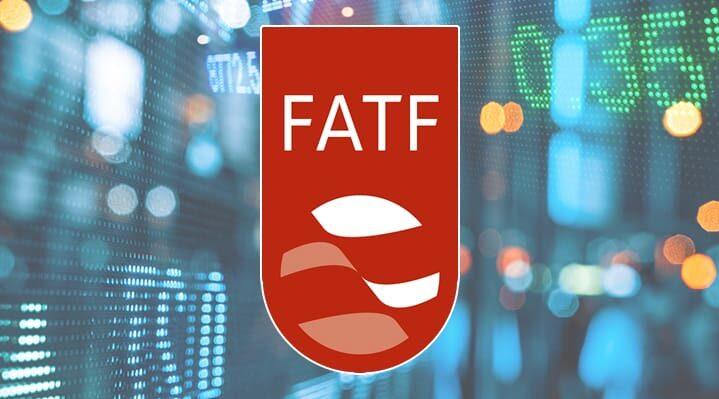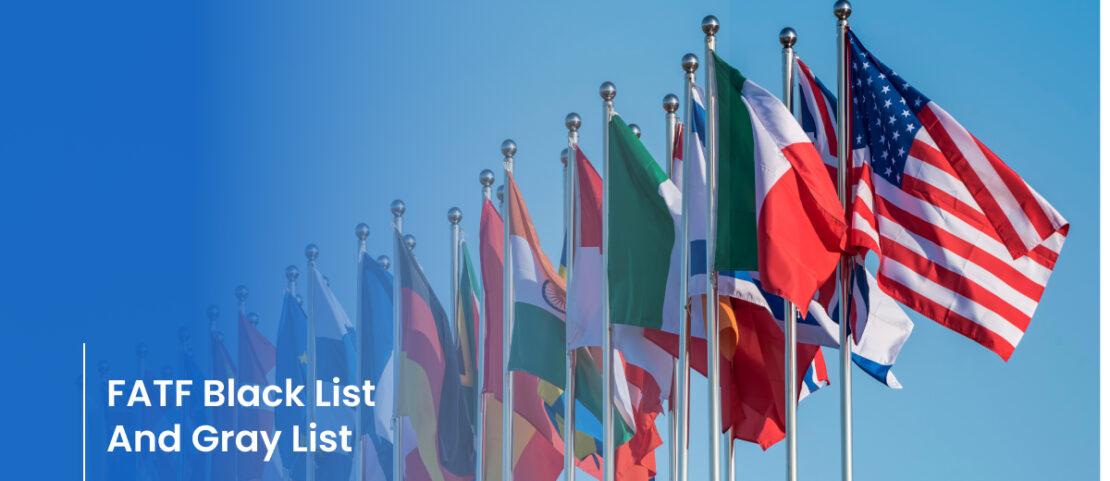The Financial Action Task Force (FATF) establishes standards to combat financial crimes, such as money laundering and the terrorist financing. As part of assessing the success of these recommendations, the FATF issues and regularly updates “grey” and “black” lists, which include countries whose financial operation control systems have significant deficiencies. Being listed can greatly impact a jurisdiction’s economy, financial flows, and international reputation. In this article, we will cover all the important details of the FATF’s black and grey lists, provide examples of countries on these lists, and also offer practical advice on complying with anti-money laundering requirements.

What is FATF?
The Financial Action Task Force (FATF) is an international intergovernmental organisation established in 1989 at the initiative of the G7 countries. Its primary objective is to develop and promote policies to combat global money laundering, terrorist financing, and other threats to the integrity of the international financial system.
The FATF consists of 39 members, including 37 jurisdictions and 2 regional organisations (the European Commission and the Gulf Cooperation Council). Furthermore, the FATF closely cooperates with regional organisations, extending its influence to over 200 countries.
The FATF sets standards and recommendations aimed at preventing financial crimes, and protecting the global financial system. The organisation monitors countries’ progress in implementing these recommendations through a process of mutual evaluations and periodic reviews.
The FATF has developed 40 Recommendations that serve as an international standard for devising effective measures against money laundering and the financing of terrorism.
These recommendations cover various aspects, including the establishment of criminal liability for financial crimes, the introduction of customer identification procedures (KYC), proper customer due diligence (CDD), record-keeping and reporting of suspicious activity, and the establishment of regulatory bodies and control mechanisms for financial institutions.
What is FATF Greylisting?
The FATF Grey List is a register of countries under increased monitoring, which have deficiencies in their anti-money laundering and counter-terrorist financing (AML/CFT) systems, but have committed to addressing these deficiencies within agreed timeframes. Being placed on this list signals to the international community that the jurisdiction requires heightened attention and cooperation to enhance its financial system.
-
The grey list includes countries that:
- They have strategic deficiencies in their AML/CFT systems.
- They have taken on high-level political commitments to work with the FATF to address these shortcomings.
- They are under enhanced FATF monitoring and regularly report on progress.
Any country can find itself on the grey list if its AML/CFT (Anti-Money Laundering/Countering Financing of Terrorism) system has strategic deficiencies that pose a threat to the international financial system. This can include both developing and developed countries.
Leading factors for inclusion in the list:
- The absence or ineffectiveness of legislative framework for AML/CFT;
- Insufficient oversight of financial institutions;
- Shortcomings in identifying the beneficial owners of companies;
- The absence of effective measures to freeze the assets of terrorists;
- Insufficient international cooperation and information exchange.
Among the key consequences of being placed on the FATF grey list are a reduction in investor confidence, enhanced due diligence measures (EDD), a decrease in credit rating, slower international payments, a reduction in international trade, and an increase in borrowing costs due to heightened risks.
Furthermore, a country’s inclusion on the grey list significantly impacts business. Primarily, it leads to an increase in regulatory burden, requiring companies to conduct more thorough checks on counterparties and clients. This results in higher operational costs due to the implementation of new procedures and compliance systems. There may also be delays in international payments due to additional verifications, as well as complications in managing partnership relations.
Experienced professionals can provide assistance in risk assessment, developing effective procedures and policies for AML/CFT compliance, and conducting training for staff and regulators.

How Does Greylisting Work?
The FATF and its regional partners conduct mutual evaluations of member countries for compliance with the 40 Recommendations. During such evaluations, the effectiveness of national AML/CFT systems is analysed, including legislation, regulatory bodies, enforcement mechanisms, and international cooperation.
If the assessment reveals significant deficiencies that could pose a threat to the international financial system, the FATF begins a more thorough examination of the situation in the country. The organisation engages in constructive dialogue with the country’s authorities, proposing to develop an action plan to combat money laundering, address the identified deficiencies with specific measures and timelines for their implementation.
If a country agrees with the assessment results and commits to implementing the action plan, it is officially placed on the grey list. This decision is published on the official FATF website and communicated to the international community.
The FATF, in turn, publishes updates on each country following its plenary sessions. When a country successfully implements all the action plan points and the FATF confirms the effectiveness of the measures introduced, it is removed from the grey list. This is also officially announced and published.
FATF Greylist Countries List
Being placed on the grey list means that a country has committed to political obligations to address identified deficiencies within specified timeframes and is under constant monitoring by the international community. For businesses, this signals the need for heightened scrutiny when conducting financial transactions with counterparts from these countries.
Countries on the FATF grey list:
- Albania;
- Armenia
- Barbados;
- Burkina Faso
- Haiti;
- Ghana;
- Gibraltar
- Democratic Republic of the Congo
- Yemen;
- Jordan;
- Cambodia
- Cayman Islands
- Mali.
- Morocco;
- Mozambique
- Nigeria;
- United Arab Emirates
- Panama.
- Senegal
- Syria;
- Tanzania
- Turkey;
- Uganda;
- Philippines;
- South Africa
- South Sudan
- Jamaica.
However, the grey list is frequently updated and can change due to countries being added or removed. Therefore, it’s best to check the latest information on the FATF’s official website.
What is the FATF Blacklist?
The FATF blacklist is a list of countries and territories that have significant strategic deficiencies in their anti-money laundering and counter-terrorist financing (AML/CFT) systems and do not demonstrate sufficient political will to address these deficiencies.
Such jurisdictions pose serious risks to the international financial system, and the FATF urges its member countries and other states to implement countermeasures to protect against these risks.
The main difference from the grey list is that countries refuse to cooperate with the FATF and decline to participate in the development of an action plan to improve AML/CFT systems.
As of October 2024, the FATF has called on its members and other jurisdictions to implement countermeasures against the Democratic People’s Republic of Korea (DPRK), Iran, and Myanmar.
Grey Lists, Blacklists, and AML Compliance
The FATF’s grey and black lists serve as a valuable source of information for compliance professionals. Companies check partners and clients against these lists, as well as implement special systems for assessing risks when dealing with individuals or organisations operating within these jurisdictions.
For companies and financial institutions, understanding these lists and adhering to AML compliance requirements is critically important. AML compliance consists of a set of procedures and measures aimed at preventing the use of financial systems for money laundering and the financing of terrorism. Compliance is mandatory for institutions and companies providing financial services. Violating AML requirements can result in fines, sanctions, and even criminal penalties.
Screening
Screening is the process of checking clients and counterparties against various databases and lists, including sanctions lists, lists of politically exposed persons (PEP), FATF Grey and Black Lists, and lists of offenders. The purpose of the screening is to identify potential risks of cooperation with individuals or organisations, ensuring compliance with international and national sanctions.
To ensure compliance with AML/CFT requirements, it’s crucial for companies to vet their clients and partners against both the FATF’s black and grey lists. It’s also important to note that these lists are updated three times a year, so there’s a need to regularly check both new and existing clients. Part of adhering to FATF recommendations and maintaining a robust compliance programme involves the use of sanction screening and watchlists for individuals and legal entities your business deals with.
Transaction monitoring
It’s also extremely important to have well-established processes for proper customer due diligence (CDD). This way, a business can definitely verify the countries in which your clients operate.
Customer Due Diligence (CDD) is the process of conducting appropriate checks on clients, which involves collecting and analysing information about the client to assess potential risks. The first step is the identification of the client and the collection of basic information (name, address, date of birth, documents). This is followed by the verification of information and confirmation of the authenticity of the provided data. The final stage involves analysing the client’s financial activities, their profile, and geographical location.
Enhanced Due Diligence (EDD) is applied to high-risk clients, including Politically Exposed Persons (PEPs), clients from countries on the FATF grey and black lists, and other categories.
Transaction monitoring is the process of tracking clients’ financial transactions to identify suspicious activity. The main goal is to detect unusual or suspicious payments and ensure compliance with regulatory reporting requirements.
Greylisting, Blacklisting, and Whitelisting: The Differences
The FATF white list is an unofficial term used to denote countries that largely comply with FATF standards and are not included in either the grey or black lists. These countries have successfully undergone mutual evaluations and demonstrated effective AML/CFT systems.
Since the list is not an official FATF document, the compilation of countries is based on the general level of compliance with the recommendations. Examples of such countries include the USA, Canada, Australia, the UK, Japan, Germany, and many others.
Following the successful implementation of the action plan and the rectification of deficiencies, a country is removed from the grey list and placed on the white list. Should the commitments not be met, it could be moved to the black list. Exiting the black list is possible by demonstrating significant progress and a political willingness to cooperate with FATF.
How to get Removed from the FATF Grey List?
After identifying deficiencies, the FATF, in collaboration with the country’s authorities, develops a detailed action plan. This plan includes specific measures to address the identified issues, timelines for implementing each point of the plan, responsible bodies, and their roles in the execution of the established measures.
The country must adapt its national legislation in accordance with the 40 Recommendations of the FATF, introduce new laws or amendments to strengthen the AML/CFT system, and also ensure criminal liability for money laundering and terrorist financing.
It is also necessary to establish or strengthen regulatory bodies responsible for monitoring financial institutions and businesses, and to develop effective coordination mechanisms between various government departments.
Financial institutions and other accountable entities must implement customer due diligence (CDD) procedures to identify and verify individuals, as well as establish transaction monitoring systems to detect suspicious activity.
Furthermore, it is necessary to create registries of beneficial owners of companies and other legal entities, to prevent the use of front men and shell companies for concealing illegal activities.
The country is required to provide regular reports on its progress in implementing the action plan, participate in FATF plenary sessions and other working groups. The FATF and its regional partners conduct regular assessments of the country’s progress. On-site missions can be organised to verify the effectiveness of the measures implemented locally.
A country can be removed from the grey list if it has fully implemented all the action plan items, proven the effectiveness of new legislative and institutional measures, and demonstrated the resilience of its AML/CFT system to money laundering and terrorist financing risks. An official announcement is published on the FATF website and communicated to the international community.
How Can We Help?
Our sanctions experts provide professional consultations on the current FATF requirements and will assist your company in developing and implementing effective anti-money laundering and counter-terrorism financing programmes. This will ensure compliance with international standards and local legislation.
We will conduct a comprehensive risk assessment of your company related to operations in jurisdictions on grey and black lists, identify potential vulnerabilities, develop strategies for their minimisation and management, and also help avoid possible fines and sanctions from regulators.
Our sanctions solicitors have extensive experience in handling international transactions. Experienced professionals are ready to conduct legal analysis and due diligence on counterparties from high-risk jurisdictions, prepare and review contracts for compliance with AML/CFT requirements, as well as protect your interests in complex international projects.
We offer training programmes for your employees on the effective use of compliance tools in their daily work. Additionally, our specialists provide services for removal from the FATF and SDN lists.
Contact us right now for an initial consultation and to clarify the complex legal aspects of FATF activities. Our specialists will help ensure the security and resilience of your business.


